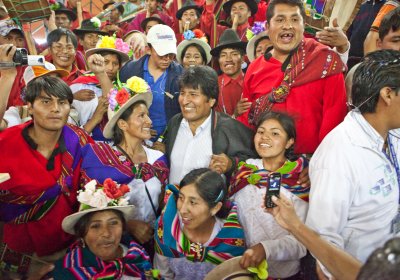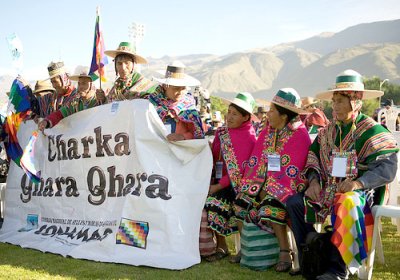Ironically, while the left is one of the fiercest critics of biased media coverage, it can also fall in the trap of corporate media distortions, particularly if its coverage dovetails with its own fantasies.
A May 14 article by Daniel Lopez published on the website of Australian group Socialist Alternative is proof of this.
The article echoes the view of a May 10 article on the BBC website, which has a clear dislike of Bolivian President Evo Morales.
Federico Fuentes
The tremendous success of the April 19-22 World Peoples Summit on Climate Change and Mother Earth Rights held in Cochabamba, Bolivia, has confirmed the well-deserved role of its initiator — Bolivian President Evo Morales — as one of the world’s leading environmental advocates.
Since being elected the country’s first indigenous president in 2005, Morales has continuously denounced the threat posed by the climate crisis and environmental destruction.
Morales has pointed the figure at the real cause of the problem: the consumerist and profit-driven capitalist system.
“There are two ways forward: Either save capitalism, or save Mother Earth”, Bolivian President Evo Morales said, stressing that this was the choice facing governments at a May 7 press conference in New York. There, he discussed the outcomes of the 35,000-strong World People’s Summit on Climate Change and the Rights of Mother Earth with United Nations Secretary-General Ban Ki-moon.
Perhaps no other sector better exemplifies the challenge the Bolivian government faces in lifting the country out of the poverty and dependency afflicting South America’s poorest nation than its all-important mining industry.
Mining minister and former miners’ union leader Jose Pimentel told Green Left Weekly: “Bolivia has been a mining country for more than 500 years, ever since the Spanish came and discovered the legendary wealth [of the silver mines] of Potosi.”
Under the new constitution approved in January 2009, the state now controls all minerals, metals, precious and semi-precious stones in the country.
While respecting previously granted concessions to private companies, it has restricted new concessions to joint ventures with the state
In 2007, the Bolivian government returned 100% control of the Huanuni tin mine to the state-owned Comibol.
On May 3, the government nationalised the Glencore-owned antimony smelter, which has been out of operation for more than two years.
In the Cochabamba football stadium on April 22, diverse indigenous peoples paraded around the track, thousands of local peasants sat in the stands, and thousands more activists from around the globe waved flags and chanted on the field.
A common sentiment flowed through the crowd: something historic had occurred over the previous three days during the April 19-22 World People’s Conference on Climate Change and the Rights of Mother Earth organised by the Bolivian government in Cochabamba.
CARACAS — Following nation-wide assemblies involving more than 10,000 electricity workers to collectively discuss solutions to the sector’s problems, 600 delegates gathered in Caracas on April 8-9.
Although final figures will not be known until April 24, the results of Bolivia’s April 4 regional elections have ratified the continued advance of the “democratic and cultural revolution” led by the country’s first indigenous President Evo Morales.
“The free, sovereign and independent homeland of our dreams will only come true if we radicalise the process and speed up the transition to socialism”, Venezuelan President Hugo Chavez wrote in his March 14 weekly column “Chavez Lines”.
The US authorities continue to harbour Branko Marinkovic, a leader of the Bolivian right-wing opposition accused of financing a terrorist cell to assassinate Bolivian President Evo Morales.
Decisive battles between the forces of revolution and counter-revolution loom on the horizon in Venezuela.
Addressing delegates at the International Encounter of Left Parties held in Caracas, November 19-21, Venezuelan President Hugo Chavez said that with the capitalist crisis and threat of war risking the future of humanity, “the people are clamoring” for greater unity of those willing to fight for socialism.
- Previous page
- Page 24
- Next page






